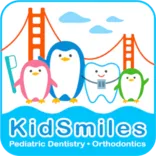The first permanent molars (which are not preceded by primary teeth) begin erupting around the age of 6. Extra care should be given to this first set of molars; they have a significant impact on the structure and position of future erupting teeth and, consequently, the shape of your child's lower face
Read moreRequest an Appointment:
Call or Text: 415-681-KIDS (5437)
-
Permanent Teeth
-
Plaque
Plaque is a film of bacteria that forms on your teeth and gums after eating foods that produce acids. These foods may include carbohydrates (starches and sugars), such as candy and cookies, and starchy foods such as bread, crackers, and cereal. Tooth decay, commonly known as cavities, occurs when
Read more -
Preventing Cavities
Saliva is your body's best mechanism for fighting the destructive forces of acids formed by plaque. Saliva acts as a buffer and re-mineralizing agent. Sugarless gum is one way to stimulate the flow of saliva in your mouth in between brushings. The best way to prevent cavities, however, is to brush and
Read more -
Prevention Tips for Children
Infants Infants should be seen by our office after the first six months of age, and at least by the child's first birthday. By this time, the baby's first teeth, or primary teeth, are beginning to erupt and it is a critical time to spot any problems before they become big concerns. Conditions like
Read more -
Primary Teeth
Teeth are a wonderfully complex part of the human body. It is easy for most of us to overlook all of the ways that our teeth have an impact upon our daily lives from birth to old age - from affecting the overall look of our face and enjoying foods, to the important role they play in helping to prevent
Read more

